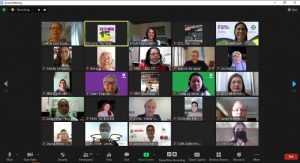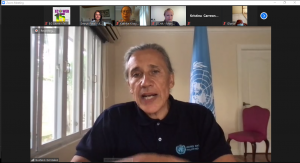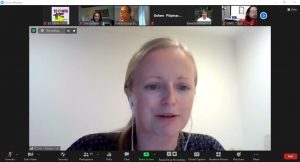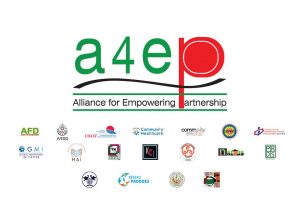Nearly a hundred representatives from local and national CSOs, INGOs, UN agencies, private sectors, and national and local governments virtually gathered in the Philippines via Zoom videoconference last June 10, 2021 for an inter-agency and multi-stakeholder dialogue to identify actions for a road map to localisation. This event was part of the humanitarian and development actors to move forward localisation commitments in the country.
Implementing the localisation commitment at the country-level was observed to have a slow progress ever since the launching of the Grand Bargain in 2016. One of its cores is to improve the effectiveness and efficiency of humanitarian action. With the involvement of local and national CSOs to various consultations which fore fronted the World Humanitarian Summit, donors and aid organizations all over the world aim to lead more advocacy of the Grand Bargain commitments at country-level.
One of the signatories’ initiatives is to map the state of localisation by administering dialogues which targets to raise more awareness of the Grand Bargain localisation commitments as well as documenting the good practices and areas of considerations to further understand country-level progress on the commitments set during the World Humanitarian Summit.
With this, as a global effort, the Philippines undertakes its dedication and responsibility taking bigger leap in promoting and advocating the Grand Bargain localisation commitments. Hence, the conduct of series of virtual dialogues to move forward localisation in the Philippines.


Ecosystems Work for Essential Benefits, Inc. (ECOWEB) is taking the lead in the process and Alliance for Empowering Partnerships (A4EP), as the 63rd signatory of the Grand Bargain has committed to support this meaningful event. In collaboration with UN OCHA, OXFAM Philippines and proactive support from the UN Resident Coordinator, the dialogue was organized to promote and institutionalize the implementation of Grand Bargain commitments on localisation and participation revolution. This is conducted with the support from the Center for Disaster Preparedness (CDP), Philippine Preparedness Partnership (PhilPrep) and Asian Preparedness Partnership (APP).
The virtual dialogues helped build the momentum by exploring synergies and connections with existing humanitarian coordination mechanisms, funders and Philippines INGO networks, private sectors, local and national CSOs, and national authorities – which are also given the spotlight to share and express their community-led programming, emphasis on local standards and feedback, and streamlined activities in facilitating strategic and community-based interventions. This way, developing a country-level action plan and tracking mechanism will be established to look into localisation potentials and hardships and how it can be brought up and reported to the international actors.
As a background, before the multi-stakeholders was held, a methodology was developed for the dialogue process which includes the dissemination of online survey questionnaires that was completed by 63 CSOs and private sectors and 15 INGOs and UN agencies. A community-level focus group discussion integrating the community score card process was also conducted and participated by 236 participants in the six regions from affected population of crisis in the Philippines.
The results of the FGD and survey were presented during the multi-stakeholder dialogue. The participants were then divided into eight groups, each of which focused on a different facet, commonly the Grand Bargain commitments and the steps that needed to be taken, with one group focusing on COVID-19’s impact. They were instructed to develop at least three key actions in each facet and categorize them as collective, strategic, operational, or agency-level.
The dialogue is a call to urge international and national governments to provide the space and resources necessary for local civil society to thrive and make longer-term platforms to collaborate various sectors and stakeholders to improve people’s living conditions, specifically affected communities, and complement development and humanitarian initiatives.
Gustavo Gonzales, UN Humanitarian Coordinator in the Philippines remarked that the localisation agenda is part of a very important transformation of aid architecture. He expressed that the imperative aid of localisation is fundamental in recognizing the capacities at the local to national level. He emphasized that complementation is an important aspect in investing to localisation.

It was emphasized during the plenary sharing that most of the local operations are in line with the community-driven development approach and involving the affected population in all process of project development as well as humanitarian processes. It was highlighted that capacity strengthening and development of the community populations are important commitments to make local efforts become sustainable.
Bong Masagca of People’s Disaster Risk Reduction Network (PDRRN) said that international actors should recognize and support on what are being asked from the existing local system, structures, culture and the likes which are also relevant to preparedness, response and recovery. He emphasized that there should be ensuring of accessible, equitable and quality assistance to all in need.
From the lens of civil society organizations, Atty. Padoman Paporo, an IDP leader from Marawi City who has been proactive in lobbying IDP rights with ECOWEB’s support, compensation and raising rehabilitation concerns of the Islamic City to the government, shared her reflections from the dialogue. She stressed about the importance of stakeholders’ consultation and assemblies and how this positively influenced Bangon Marawi CSO platform to heighten local responses.

She highlighted about the survivor and community-led response (sclr) which she thinks is the best approach to give doable solutions to duty bearers and ensures engagement, coordination, and convergence in the local level.
Shem Guiamil of the BARMM Ministry of Social Services and Development expressed that there are a lot of enormous need happening in the country. He said that localisation is the way to definitely address the humanitarian needs as it come from time to time.

Med Villanueva, representative of National Anti-Poverty Commission – Victims of Disaster and Calamities highlighted that localisation means integration of all the kindness from the hearts if the international community, of governance, of us simple Filipinos in need.

Veronica Gabaldon, Executive Director of Philippine Disaster Resilience Foundation underscored that it is high time to operationalize and see localisation happening. She said that it should start at the very basic unit of the society and trusting their capacities to building their resilience.
“In the context of the private sector, where we have business continuity as a mechanism to make sure that our operations continue even in the face of disaster, it is important that the community is resilient on their own. To realize this, we have to focus on preparing them, capacitating them and all has been discussed today will come to play.” said Gabaldon.
Lot Felizco, Country Director of OXFAM Philippines iterated that there is so much to be done to make the commitments and principles get translated into actions that will really change practices and behaviors. She challenged the participants to commit on getting involved in advocating localisation and making it into concrete actions for the roadmap to take effect meaningfully. She expressed that moving forward localisation is a challenge that can only be directed towards us at a country level.

Manja Vidic, Head of UN OCHA Philippines emphasized that localisation is about complementarities and not competition. She added that localisation is about partnership and relationship-building and not replacing one another. She talked about creating safe spaces for dialogues and coordination, and how are these significant in action planning and bringing this out to the international level.

Lastly, Regina Antequisa expressed her gratitude to all stakeholders, sectors and partners who have participated in the series of dialogue and for investing their time and commitment to push forward the localisation in the Philippines through an online dialogue. Amid the challenges and paradigm shift caused by the COVID-19 outbreak, she highlighted that even it was conducted online, everyone pushed through and continued joining the call to advocate, promote and further steadfastly the localisation in the country. As part of the global localisation movement, she recognized all the people affected by crisis’ capacities and trusting them is an empowering step to see that localisation can progress.

The learning and results from this process will be shared with the Grand Bargain Localisation workstream and the other signatories at the global level. We hope that this procedure would inspire and urge other countries to start their own localization processes. As highlighted by Padoman Paporo, “Nothing about us, without us!”, so let us walk the talk and make localisation move forward and keep going onwards!



